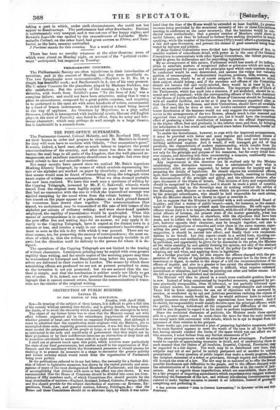THE POST - OFFICE SUPERSEDED.
The Postmaster-General, Colonel Moberly, and Mr. Rowland Hill, may set their houses in order and prepare to evacuate St. Martin's-le-Grand; for they will soon have to exclaim with Othello, " Our occupation's gone!" It seems, indeed, a hard case, after so much labour to improve the postal communications of the country, and after steam has done its utmost to hasten the mail-bags to all parts of the kingdom, that the well-planned ar- rangements and excellent machinery should come to nought: bat even they must submit to fate and scientific invention.
Not many months have passed since we noticed Mr. Bain's ingenious Marking Electric Telegraph, by means of which symbols representing let- ters of the alphabet are marked on paper by electricity; and we predicted that means would soon be found of transmitting along the telegraph-wires exact copies of written communications. What we then deemed probable has now been realized. We have this week seen a specimen of writing by the Copying Telegraph, invented by Mr. F. C. Bakewell, wherein words traced from the original were legibly copied on paper by an instrument that had no connexion with the one to which the transmitted message was applied excepting by the usual wires from the voltaic battery. The let- ters traced on the paper appear of a pale colour, on a dark ground formed by numerous lines drawn close together. The communications thus traced, we understand, may be transmitted at the rate of 500 letters of the alphabet per minute of ordinary writing; and were short-hand symbols employed, the rapidity of transmission would be quadrupled. When this means of correspondence is in operation, instead of dropping a letter into the post-office box and waiting days for an answer, we may apply it di- rectly to the Copying Telegraph, have it copied at the distant town in a minute or less, and receive a reply in our correspondent's handwriting al- most as soon as the ink is dry with which it was penned. There are va- rious means, too, for preserving the secrecy of correspondence; the most cu- rious of which is, that the writing may be rendered nearly invisible in all parts but the direction until its delivery to the person for whom it is de- signed.
The operations of the Copying Telegraph are not limited to the tracing of written characters. Letterpress printing may be copied with even greater rapidity than writing, and fac-simile copies of the morning papers may thus be transmitted to Liverpool and Manchester long before the papers them- selves are delivered to their readers in London. The means by which these astonishing effects are produced we are not at present permitted to state, as the invention is not yet protected; but we are assured that the me- thod is simple, and that the mechanism is neither costly nor likely to get out of order. It is, indeed, one of the peculiar features of the Copying Te- legraph that it cannot commit errors, because the communications it trans- mits are fac-similes of the original writing.


























 Previous page
Previous page